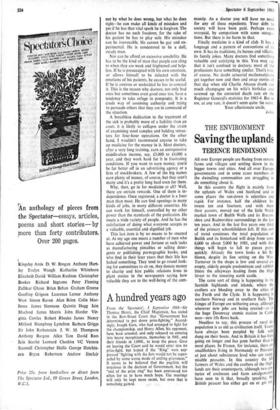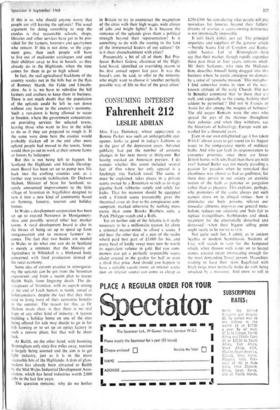Saving the uplands
THE ENVIRONMENT TERENCE BENDIXSON
All over Europe people are fleeing from remote farms and villages and settling down in the bigger towns and cities. And all over Europe governments and in some cases members of the dwindling communities are struggling to do something about it.
In this country the flight is mainly from the uplands of Wales and. Scotland and in some places the run-down is relentless and rapid. For instance, half the children be- tween ten and fourteen, and with them their parents, moved out of the little Welsh market town of Builth Wells and its Brecon- shire and Radnorshire surroundings in the last ten years. And in the last five years one third of the primary schoolchildren left. If this sort of trend continues the total population of Builth and its hinterland will drop from some 6,000 to about 5,000 by 1981, and with that things will begin to fall to pieces pretty quickly. Already the town looks a bit fly- blown, despite its fine setting on the Wye. Turnover in the shops is low and several are empty, elderly people predominate and rubbish litters the alleyways leading from the High Street to the towering earth castle.
The same sort of thing is happening in the Scottish highlands and islands, where the crofters are bleeding away to the cities of the Forth and the Clyde. It is happening in northern Norway and in southern Italy. The fringes of Europe are withering away, although wherever new jobs are being created—as at the huge Dounreay atomic station in Can. ness—new life flows back.
Needless to say, this process of rural de- population is as old as civilisation itself. Towns have always been peopled by folk with dung on their boots. And in Britain it has been going on longer and has gone further than in most places. In France, for instance, there are smallholders living in Normandy or Provence at just about subsistence level who are recog- nisable peasants. In this country the hail farmers of Wales and the crofters of the High. lands are their counterparts, although two cep• tunes of enclosure and farm amalgamation have seen to it that, broadly speaking, the British peasant has either got on or got out
If this is so, why should anyone worry that people are still leaving the uplands? The usual argument for doing something to stop the exodus is that reasonable schools. shops, libraries and other services have got to be pro- vided for the farmers, foresters and quarrymen who remain. If this is not done. so the argu- ment goes, then such people will have to live out of mail-order catalogues and send their children away to live in hostels, as they already do in the Highlands. when the time comes for them to go to high school.
In fact, the real agricultural backbone of the country resides not in the hills but in the flats of Romney Marsh, the Fylde and Lincoln- shire. As it is, we have to subsidise the hill farmers and crofters to keep them in business. There is not much doubt that the population of the uplands could be left to run down without any harm to the country's economy. Such a run-down is being allowed to occur in Sweden, where the government concentrates on providing .services for selected towns, leaving those who want to live in the wilds to do so if they are prepared to rough it. If the same were done here the exodus would probably slacken off in the end after most upland people had moved to the towns. Some would then go out to work at their remote farms or forests by helicopter.
But this is not being left to happen. In Scotland the Highlands and Islands Develop- ment Board has been set up to pump new life back into the crofting counties and, as a further step towards stabilisation. Dr Dickson Mabon, Minister of State for Scotland, re- cently announced improvements to the little village of Strontian in Argyllshire designed to turn it into a_ new kind of community based on farming, forestry. tourism and holiday homes.
In Wales a development corporation has been set up to expand Newtown in Montgomery- shire and possibly several other key market towns. A rural development board is also in the throes of being set up to speed up farm. reorganisation and so increase farmers' in- comes. The fact that two bodies are needed in Wales to do what one can do in Scotland is merely a reminder that the Ministry of Agriculture in Whitehall is a blinkered body concerned with food production instead of the rural economy.
Some idea of current practice in reinvigorat- ing the uplands can be got from the Strontian experiment and from a recent plan to rescue Builth Wells from lingering death. The de- ■ elopment of Strontian. with its superb setting at the end of Loch Sunart. is firmly aimed at holidaymakers, despite the fact that they then tend to bring most of their economic benefits in the summer. The reason for this. as Dr Mabon made clear, is that there is no real hope of any other kind of industry. A tycoon building a holiday home on one of the sites being offered for sale may decide to go in for fish farming or to set up an optics factory in such a remote place, but that will be sheer luck.
At Builth, on the other hand, with booming Birmingham only sixty-five miles away, tourism is largely being scorned and the aim is to get light industry, just as it is in the more accessible bits of the Highlands. A firm of glass- makers has already been attracted to Builth by the Mid-Wales Industrial Development Asso- ciation, which has lured industries worth 2,000 jobs in the last few years.
The question remains: why do we bother in Britain to try to counteract the magnetism of the cities with their high wages, wide choice of jobs and bright lights? Is it because the romance of the uplands gives them a political strength beyond their representation? Is it something to do with the rooting in the land of the immemorial leaders of our culture? Or is it sheer disenchantment with cities?
Presumably a bit of all of them. But Pro- fessor Robert Grieve, chairman of the High- land board, identified an overriding reason in his first annual report last year. It was the board's aim, he said, to offer to the minority who might want to choose it 'another perfectly possible way of life to that of the great cities.'







































 Previous page
Previous page